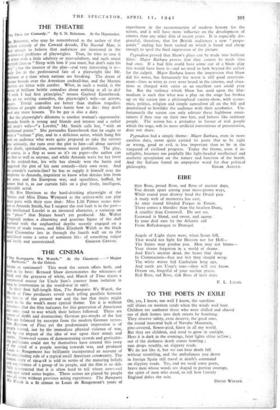THE THEATRE
No Time for Comedy." By S. N. Behrman. At the Haymarket.
BEHRMAN, who may be remembered as the author of that 'limit comedy of the Coward decade, The Second Man, is d enough to believe that audiences are interested in the fessional problems of playwrights. True, he tries to ease it down with a little adultery or near-adultery, and such smart yish lines as "Sleep with him if you must, but don't ruin his " ; but the interest of the play—and very interesting it is— ally lies in the professional fate of a playwright like Mr. human at a time when nations are breaking. The doom of urope broods over the American cocktail=bar, and the Martini erries are bitter with cordite. What, in such a world, is the Titer of brilliant brittle comedies about nothing at all to do? I wish I had first principles," moans Gaylord Easterbrook. ut go on writing comedies, the playwright's wife—an actress, ues. Trivial comedies are better than shallow tragedies. lillions of people already have learnt how to die: they don't ed any more lessons. To be gay is also a duty.
But the playwright's dilemma is another woman's opportunity. anda Smith is young and blonde and intense and a rather oil man's wife—" a Lorelei," Mr. Smith calls her, "with an ellectual patter." She persuades Easterbrook that he ought to me a " serious " play, and in a delicious scene, which hung fire ith an audience who were quite prepared to take the serious ay seriously, she runs over the plot to him—all about survival er death, spiritualism, enormous moral problems. The play, I course, is a flop as soon as it's on paper—the author can that as well as anyone, and while Amanda waits for her lover the cocktail-bar, his wife has already won the battle and ested the plot of his next comedy—their own story. And
e comedy's curtain-line? he has to supply it himself over the elephone to Amanda, impatient to know what detains him from er arms and the European war, and speechless, baffled, he at find it, as our curtain falls on a play lively, intelligent,
irably acted. • Mr. Rex Harrison as the hard-drinking playwright of the thirties and Miss Diana Wynyard as the actress-wife can play ese parts with their eyes shut: Miss Lilli Palmer seems mis- cast as Amanda Smith, but I suspect the real fault is in the part— his intellectual Lorelei is an invented character, a variation on the "piece" that Nature hasn't yet produced. Mr. Walter Fitzgerald makes . a charming and gracious figure of the dull husband with the unplumbed depths secretly engaged on a history of trade routes, and Miss Elizabeth Welch as the black maid Clementine lets in through the fourth wall on to the specialised scene a sense of common life: of something vulgar






























 Previous page
Previous page